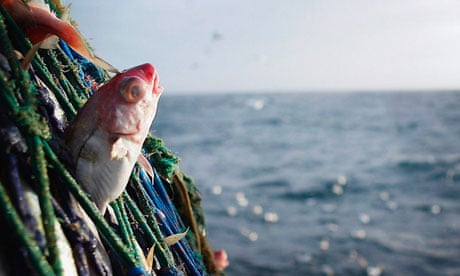The UK government has hailed a "historic" EU agreement to introduce a blanket ban on the "scandal" of dumping dead fish back in the sea.
The agreement is the culmination of efforts by campaigners, including the chef Hugh Fearnley-Whittingstall, to have the practice outlawed. Currently, as much as two thirds of healthy fish brought on to fishing vessels is thrown back into the sea dead, because they are less valuable than the species the fishermen are targeting.
The move follows an emphatic vote in the European parliament earlier this month in which MEPs voted 502 to 137 to end the practice.
Speaking from Brussels after marathon talks, fisheries minister Richard Benyon described the decision by ministers as "a historic moment in reforming the broken common fisheries policy" (CFP).
"The scandal of discards has gone on for too long and I'm delighted that the UK has taken such a central role in securing this agreement.
"I am disappointed that some of the measures required to put this ban into place are no longer as ambitious as I had hoped but it's a price I am willing to accept if it means we can get the other details right." The final package will need to be agreed by the EU parliament and MEPs could vote to make the ban more stringent.
The issue galvanised wide UK support when chef Fearnley-Whittingstall launched a "discards campaign", which has so far attracted more than 850,000 signatures on a petition condemning the throwing away of edible fish to avoid breaching limits.
The EU fisheries commissioner, Maria Damanaki – who once admitted the CFP was "broken" – says the discards system means almost one-quarter of all fish caught in European waters is being dumped at sea.
The biggest resistance to fisheries reform on the scale demanded by MEPs came from France, Portugal and Spain.
The agreement will see the discarding of edible fish banned for stocks including herring and whiting from January 2014. A ban for white fish stocks was also agreed, to begin in January 2016.
The UK also claimed to have successfully fought off attempts to include a modification in the new CFP for quota-swapping that would have allowed other countries access to UK quotas.
Bertie Armstrong, the chief executive of the Scottish Fishermen's Federation, said: "Ministers seem to have taken care to agree upon a practical plan that would work for the fishing industry and we are pleased that a more realistic timescale for the implementation of a discards plan was agreed.
"We also welcome the provision for a degree of flexibility in the plan so as to take into account any practical difficulties in implementing the scheme.
"There has been some criticism from the green lobby on this agreement, but the compromises agreed will assist in the practical implementation of the plan and this should be welcomed.
"It is very easy to have the luxury to commentate and criticise from the outside, without actually being involved in the practical implementation of the measures."
Scotland's fisheries minister, Richard Lochhead, said: "This negotiation is a key milestone on the road to a discard-free Europe and delivers a compromise plan which is both realistic and workable.
"No longer will European fishermen be dumping millions of tonnes of fish overboard, which is a waste of a valuable food resource to the detriment of our stocks and the industry.

Comments (…)
Sign in or create your Guardian account to join the discussion